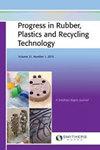使用辛酸盐淀粉提高再生低密度聚乙烯和原生低密度聚乙烯混合物的物理性能
IF 1.6
4区 材料科学
Q4 MATERIALS SCIENCE, COMPOSITES
Progress in Rubber Plastics and Recycling Technology
Pub Date : 2024-03-16
DOI:10.1177/14777606241239065
引用次数: 0
摘要
全球低密度聚乙烯消费量不断增加,导致聚合废物增多,给固体废物管理带来挑战。因此,将回收的低密度聚乙烯(RLDPE)与相同的原生低密度聚乙烯(VLDPE)进行回收或混合,并通过添加不同量的生物塑料(如辛酸淀粉(OCST))来增强这种混合物的性能,是对消除塑料废物和获得新材料的良好贡献。本文将 20、30 和 50 wt.% 的 RLDPE 与 VLDPE 混合,以确定均匀混合物。此外,还将 30、40 和 50 wt.% 的 OCST 与均质的 RLDPE: VLDPE 按 20:80 的比例混合,以获得含有生物塑料的新型混合料。扫描电子显微镜(SEM)结果表明,添加 OCST 后薄膜 RLDPE: VLDPE 的表面粗糙度很高。20:80 RLDPE: VLDPE 混合物的拉伸强度、弹性模量和硬度分别为 13.0 ± 1.467 MPa、0.08 ± 0.016 MPa 和 42.3 ± 2.32 Shore A,而 12:48:40 RLDPE: VLDPE: OCST 的拉伸强度、弹性模量和硬度分别为 14.3 ± 1.626 MPa、0.1 ± 0.032 MPa 和 50.1 ± 2.78 Shore A。另一方面,傅立叶变换红外光谱(FTIR)显示,1746 cm-1、2856 cm-1 和 2927 cm-1 处的强带分别表示 OCST 与共混聚合物的酯羰基、甲基和亚甲基的伸展变形。当 OCST 含量从 20:80 RLDPE: VLDPE 增加到 12:48:40 RLDPE: VLDPE: OCST 时,熔点、热能消耗和热流差等热性能分别从 122.52°C 增加到 123.73°C、-389.41 到 -144.43(mJ)和-77.88 到 -28.89(J/g)。在 RLDPE: VLDPE 混合料中添加 OCST 后,热分解导致在 LDPE 料筐上形成羟基和羰基等官能团,并增加了羰基指数。最佳混合料为 12:48:40 RLDPE: VLDPE: OCST。本文章由计算机程序翻译,如有差异,请以英文原文为准。
Enhancing the physical properties of recycled low-density polyethylene and virgin low-density polyethylene blend using octanoate starch
Increasing global consumption of low-density polyethylene leads to more polymeric waste and challenges solid waste management. Therefore, the process of recycling or mixing recycled low-density polyethylene (RLDPE) with the same virgin low-density polyethylene (VLDPE) and enhancing the properties of this blend by adding different amounts of bioplastic such as Octanoate starch (OCST) is a good contribution to getting rid of plastic waste and obtaining new materials. This paper mixed the 20, 30 and 50 wt.% from RLDPE with VLDPE to determine the homogeneous blend. Also, 30, 40, and 50 wt. % from OCST were blended with homogeneous as a 20:80 RLDPE: VLDPE to obtain a new hybrid blend containing bioplastic. The scanning electron microscope (SEM) results showed the high surface roughness of the film RLDPE: VLDPE after adding the OCST. The tensile strength, elastic modulus, and hardness of the 20:80 RLDPE: VLDPE blend were 13.0 ± 1.467 MPa, 0.08 ± 0.016 MPa, and 42.3 ± 2.32 Shore A, while the tensile strength, elastic modulus, and hardness of the 12:48:40 RLDPE: VLDPE: OCST were 14.3 ± 1.626 MPa, 0.1 ± 0.032 MPa, and 50.1 ± 2.78 Shore A respectively. On the other hand, the Fourier-Transform Infrared (FTIR) indicated that the strong bands at 1746 cm−1 , 2856 cm−1, and 2927 cm−1 indicated stretching deformation of the ester carbonyl group and the methyl and methylene groups of OCST with blend polymers, respectively. The thermal properties as melting point, heat energy consumption, and heat flow difference increased from 122.52 to 123.73°C, −389.41 to −144.43 (mJ), and −77.88 to −28.89 (J/g) when the OCST content increased from 20:80 RLDPE: VLDPE to 12:48:40 RLDPE: VLDPE: OCST. Thermal decomposition led to the formation of functional groups such as hydroxyl and carbonyl on LDPE baskets and an increase in the carbonyl index after adding OCST to the RLDPE: VLDPE blend. The best hybrid blend was 12:48:40 RLDPE: VLDPE: OCST.
求助全文
通过发布文献求助,成功后即可免费获取论文全文。
去求助
来源期刊

Progress in Rubber Plastics and Recycling Technology
MATERIALS SCIENCE, COMPOSITES-POLYMER SCIENCE
CiteScore
4.40
自引率
7.70%
发文量
18
审稿时长
>12 weeks
期刊介绍:
The journal aims to bridge the gap between research and development and the practical and commercial applications of polymers in a wide range of uses. Current developments and likely future trends are reviewed across key areas of the polymer industry, together with existing and potential opportunities for the innovative use of plastic and rubber products.
 求助内容:
求助内容: 应助结果提醒方式:
应助结果提醒方式:


